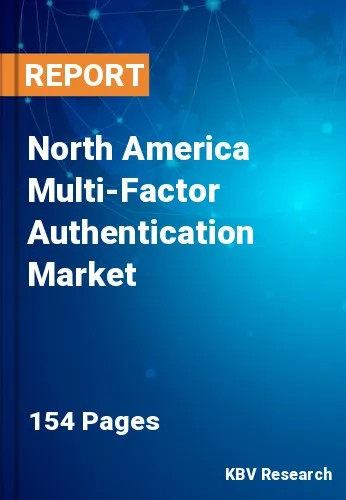The North America Multi-Factor Authentication Market would witness market growth of 14.4% CAGR during the forecast period (2023-2030).
Multi-factor authentication (MFA) is an authentication procedure that requires users to provide two or more verification aspects to access a resource, such as an application, online account, or a VPN. It is the core of a strong identity and access management (IAM) policy. Two-factor authentication (2FA), sometimes called two-step verification or dual-factor authentication, is a security procedure in which users provide two different authentication factors to verify themselves. Regarding design, these solutions are non-intrusive and do not impact the rest of an organization's digital infrastructure and services. In addition, these solutions are available to organizations in the form of APIs that can be integrated seamlessly with the organization's login pages. This flexibility and feasibility of these solutions promise significant opportunities for future market growth.
Cyberattacks and data breaches have become increasingly sophisticated and prevalent, posing significant threats to individuals and organizations. In response to this growing concern, the market has emerged as a vital sector within the cybersecurity industry, offering solutions and services designed to enhance digital security through multiple layers of identity verification. As technology evolves, the multi-factor authentication market stands at the forefront of safeguarding digital identities, applications, and systems.
North America, particularly the United States, has various regulatory requirements and industry standards that mandate or recommend using MFA. Regulations like the Health Insurance Portability and Accountability Act (HIPAA), the PCI DSS, and state-level data breach notification laws necessitate strong authentication measures. There is a growing awareness in the region among users about the importance of online security. Individuals and organizations in North America are increasingly willing to adopt MFA as a proactive measure to protect their accounts and data. The aspects mentioned above will boost market growth in this region.
The US market dominated the North America Multi-Factor Authentication Market by Country in 2022, and would continue to be a dominant market till 2030; thereby, achieving a market value of $10,307.3 million by 2030. The Canada market is experiencing a CAGR of 17% during (2023 - 2030). Additionally, The Mexico market would experience a CAGR of 16% during (2023 - 2030).
Based on Component, the market is segmented into Software, Hardware, and Services. Based on Authentication Type, the market is segmented into Password-Based Authentication, and Passwordless Authentication. Based on Model Type, the market is segmented into Two-Factor Authentication, Three-Factor Authentication, Four-Factor Authentication, and Five-Factor Authentication. Based on Vertical, the market is segmented into BFSI, Government, Travel & Immigration, Military & Defense, Commercial Security, IT, Telecommunication, Healthcare, Media & Entertainment, and Others. Based on countries, the market is segmented into U.S., Mexico, Canada, and Rest of North America.
Free Valuable Insights: The Global Multi-Factor Authentication Market is Predict to reach USD 41.5 Billion by 2030, at a CAGR of 15.2%
The market research report covers the analysis of key stakeholders of the market. Key companies profiled in the report include Microsoft Corporation, Thales Group S.A., CyberArk Software Ltd., Broadcom, Inc., Micro Focus International PLC, HID Global Corporation, Cisco Systems, Inc., Oracle Corporation, RSA Security LLC, and Salesforce, Inc.
By Component
By Authentication Type
By Model Type
By Vertical
By Country
Our team of dedicated experts can provide you with attractive expansion opportunities for your business.

